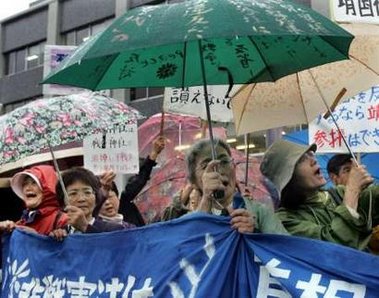This probably won't lead to a bunch of Koreans rushing to buy Macintoshes, but this can't make Microsoft's image in the ROK any bettter.
In a nutshell, Microsfot says that if the ROK government's antitrust investigation (via the Korean Fair Trade Commission) into Microsoft could lead to Windows being withdrawn from the country, or at the very least delays in introducing new versions of the operating system.
It's not as if Korea is the only country investigating the same antritrust claims (regarding MS's inclusion of streaming media and instant messenger technology into Windows), but the government is going on with the antitrust investigation even though Microsoft settled with the plaintiffs (to the tune of $761 million in cash and services). The Korean Fair Trade Commission said earlier this month that the settlement (with RealNetworks) wouldn't have any effect on its investigation into Microsoft.
Microsoft had assumed that the payment to RealNetworks would end its woes. When it found it did not, it got petty with Seoul. Microsfot is saying that the Korean commission could require the company to remove code or redesign Windows uniquely for the Korean market.
But history would indicate that vindictiveness may be what's really behind MS's threat. When MS tried to buy out Hangul-gwa-Computer's HWP (Hangul Word Processor), at the time considered such a feat of complete Koreanography that it was even placed in millennium time capsules and called a national treasure, a lot of people protested the deal (which Hangul-gwa-Computer thought they had to do because so many Koreans were copying the software without paying) and it fell through.
Microsoft did not turn tail and run. It came back to destroy HWP by offering MS Office (HWP's primary rival) at such low prices that it could be offered on every computer cheaply, and thus replace HWP as the word processor and spread sheets of choice. A legitimate copy of MS Office can be purchased for a mere fraction of its price in other countries.
So what would it mean if MS closes Windows (I couldn't resist)? Maybe a homegrown OS system would rise up. Maybe Macintosh machines would become more popular. Maybe Linux or one of those systems (if they're available in Korean) would gain popularity. Or maybe Koreans addicted to familiarity would just use the English-language (or Japanese-language) versions of Windows' latest OS offerings. Sphere: Related Content
Odds and Ends: the Innovative Korea Edition - - Somebody forgot to tell Bloomberg that Koreans are automatons who lack creativity: South Korea ranked first in Bloomberg’s Global Innovation Index. Booya...
4 hours ago




















